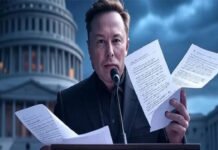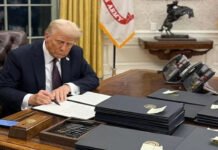INVC NEWS New York – In a sharp blow to the Trump administration’s push for government reform, a federal appeals court has refused to lift a data access ban placed on the controversial Government Efficiency Department, led by billionaire entrepreneur Elon Musk. The decision, passed by a 9-6 majority, blocks the department’s access to the Social Security System’s sensitive databases, reaffirming the protection of millions of Americans’ private information.
Federal Appeals Court Delivers Stinging Rebuke to Trump-Era Agency
The case, which pitted the Government Efficiency Department against labor unions and retired federal workers, marks a pivotal moment in the ongoing debate over data privacy and government oversight. The court’s decision emphasizes that national security and individual privacy rights must not be compromised, even in the name of administrative cost-cutting.
By refusing to lift the ban, the court has sent a clear message: federal efficiency reforms must not come at the cost of public trust and constitutional safeguards. The ruling keeps in place a critical wall between Elon Musk’s department and the treasure trove of non-anonymized personal data contained in the Social Security System.
Labor Unions and Retired Workers Secure Legal Victory
The original lawsuit was brought forward by labor unions and retired federal employees, who argued that granting access to the Social Security System would pose a significant risk of data breaches, identity theft, and surveillance overreach. Their concerns were validated by the court, which upheld their stance that opening up the system would violate privacy rights and endanger national cybersecurity protocols.
The unions asserted that even minimal exposure of Social Security data could lead to malicious exploitation. In an era where cybercrime is escalating and trust in federal agencies is waning, the court’s backing of union concerns is both symbolic and strategic.
Trump’s Controversial Efficiency Drive and Elon Musk’s Role
The Government Efficiency Department was a hallmark initiative of former President Donald Trump, aimed at reducing federal expenditures and streamlining operations. To head the initiative, Trump appointed his close ally and globally known technologist Elon Musk, a move that sparked both excitement and alarm.
Critics accused the administration of attempting to centralize control over sensitive national systems, using efficiency as a smokescreen. The attempt to tap into the Social Security System’s database was seen by many as a first step toward privatizing or reshaping essential government services, including Medicare, Social Security, and federal retirement benefits.
The opposition, led primarily by Democratic lawmakers and union leaders, accused the Trump administration of trying to erode essential safeguards under the guise of modernization. The appeals court ruling gives a second wind to that opposition.
Court Rules: Only Redacted Data Allowed, No Code Modifications Permitted
In its detailed judgment, the court laid down specific guidelines: while edited, anonymized datasets might be made available to the Efficiency Department, access to complete, unredacted information remains strictly prohibited. Furthermore, department personnel are barred from modifying underlying computer code or retaining previously acquired non-anonymized data.
The ruling also mandates that any previously obtained sensitive data must be purged immediately, and no workarounds or technical loopholes will be tolerated. The language of the court’s order was firm, emphasizing that the fundamental right to privacy cannot be sacrificed for administrative convenience.
Department’s Legal Team Argues Against Data Redaction
Attorneys representing the Efficiency Department argued that the process of data anonymization would undermine the department’s mission, adding layers of bureaucracy and inefficiency. According to their defense, the need to streamline overlapping federal programs and eliminate wasteful spending hinges on real-time access to complete datasets.
They contended that the department was formed precisely to eliminate redundancy, and partial or redacted access would cripple Musk’s data-driven reform model. However, the court concluded that operational ease does not justify compromising the privacy of over 300 million Americans.
Backlash from Tech Experts and Privacy Advocates
While some tech analysts expressed concern that the ruling could stall innovation in government services, most privacy rights groups celebrated the verdict as a landmark decision in the fight against data misuse by federal agencies.
“This ruling is a victory for digital civil liberties,” said Marla Jennings, legal director at the Center for Data Ethics. “The court reaffirmed that even the most well-intentioned government agencies cannot be allowed to act with unchecked access to personal information.”
Implications for Future Federal Efficiency Initiatives
The verdict casts a long shadow over the future of Trump-era efficiency reforms. The denial of unrestricted access to Social Security data means the Government Efficiency Department must now reconfigure its strategy or face legal action and political resistance at every turn.
Additionally, this decision may embolden other federal agencies and watchdog groups to file suits or challenge overreach in unrelated departments. Legal scholars suggest that precedents set in this case could form the basis for a broader overhaul of data access laws, particularly within quasi-private government initiatives.
Democratic Lawmakers React Swiftly to Court Ruling
Top Democratic leaders were quick to praise the court’s decision. Senator Elizabeth Warren tweeted, “The courts did the right thing today. We must protect Americans from government surveillance under the veil of efficiency.” Representative Alexandria Ocasio-Cortez echoed this sentiment, emphasizing the need for “transparency, not secrecy, when it comes to reform.”
Meanwhile, some Republican lawmakers criticized the decision, calling it a “roadblock to innovation” and an example of “judicial overreach.” However, the court’s majority made it clear that technological advancement must not compromise civil liberties.
Elon Musk Yet to Issue Official Statement
Elon Musk, who has remained relatively quiet about his role in the department following its formation, has yet to release an official comment. However, insiders suggest that Musk’s team is exploring alternative legal strategies, including petitioning the Supreme Court.
Given Musk’s background in big data, AI, and automation, analysts believe that this setback could lead him to advocate for legislative changes that support secure yet efficient access to government data in the future.
















